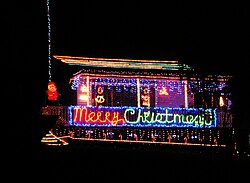Public venues
Displays
of Christmas lights in public venues and on public buildings are a
popular part of the annual celebration of Christmas, and may be set
up by businesses or by local governments. The displays utilise
Christmas lights in many ways, including decking towering Christmas
trees in public squares, street trees and park trees, adorning
lampposts and other such structures, decorating significant buildings
such as town halls and department stores, and lighting up popular
tourist attractions such as the Eiffel
Tower and
the Sydney
Opera House.
Annual
displays in Oxford Street, London,
England are adored by the public and local businesses alike, have
been erected for decades.
Neighborhoods
In
the U.S. from the 1960s,
beginning in tract
housing,
it became increasingly the custom to completely outline the house
(but particularly the eaves)
with weatherproof Christmas lights. The Holiday
Trail of Lights is
a joint effort by cities in east
Texas and
northwest Louisiana that
had its origins in the Festival
of Lights and
Christmas Festival in Natchitoches,
started in 1927, making it one of the oldest light festivals in the
United States.
It
is often a pastime to
drive or walk around neighborhoods in
the evening to see the lights displayed on and around other homes
traditionally called a Tacky
Light Tour. While some homes have no lights, others may have
incredibly ornate displays which require weeks to construct. A rare
few have even made it to the Extreme
Christmas TV
specials shown
on HGTV,
at least one requiring a generator and
another requiring separate electrical service to supply the amount
of electrical
power required.
Lights
deck the veranda of a miner's cottage in Wollongong, Australia. To
the left is a tall TV aerial.
In Australia and
New Zealand, chains of Christmas lights were quickly adopted as an
effective way to provide ambient lighting to verandas, where cold
beer is often served in the long hot summer evenings. For many years
the use of Christmas lights on Australian homes was mainly limited to
this simple form. From about 1990 increasingly elaborate Christmas
lights have been displayed and driving around between 8 and 10 p.m.
to look at the lights has become a popular family entertainment.
While in some areas there is fierce competition, with town councils
offering awards for the best decorated house, in other areas it is
seen as a co-operative effort, with residents priding themselves on
their street or their neighbourhood.

